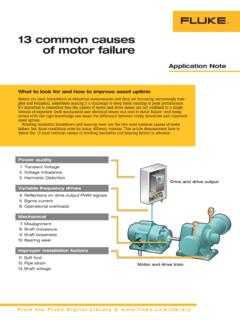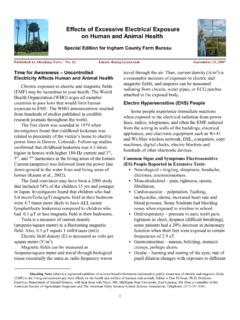Transcription of The impact of excessive speculation on commodity market …
1 The impact of excessive speculation on commodity market prices A Master s Thesis By Adam Mathews September 2012 The impact of excessive speculation on commodity market prices AR Mathews Utrecht University ii The impact of excessive speculation on commodity market prices AR Mathews Utrecht University iii A Master s thesis in the Faculty of Geosciences for Master of Science in Environmental Sciences. Name: Adam Raymond Mathews M(Phys) Student number: 3421503 Email: Permanent Address: 1 Edge Hill, Kinver West Midlands DY7 6DP UK Msc Sustainable Development Faculty of Geosciences Copernicus Institute of Sustainable Development Utrecht University Track Energy and Resources Supervisors Prof. dr. Ernst Worrell Dr. Eva Niesten (2nd reader) The impact of excessive speculation on commodity market prices AR Mathews Utrecht University iv The impact of excessive speculation on commodity market prices AR Mathews Utrecht University v Acknowledgements and Foreword This thesis was inspired by my real-world experience of the difficulties of trading commodities where supply and demand are only partially reflected in prices.
2 Many within industry blame this on financial speculation , so it was to that end that I wished to investigate the role of finance in setting commodities prices. This thesis did not simply improve my knowledge of a discipline (financial economics) which is increasingly important in today s world, it also taught me a lot about regulatory decision-making and econometric techniques for testing the hypotheses outlined in conventional economics. For that I am grateful to the flexibility shown by the Faculty of Geosciences at Utrecht University for allowing me to study a subject which is not obviously related to the Sustainable Development master s programme. I am eternally grateful to both my parents, Peter and Gill, without whose support under trying circumstances none of this would have been possible. I would also like to thank my supervisor Ernst Worrell for his enthusiasm about this topic, Professor Christopher Gilbert of the University of Treno for providing me with data and advice, as well as Sascha Otto for taking the time to answer my questions.
3 Finally, I d like to thank all of those I have met in Utrecht who have helped me during the writing of this thesis and from whom I have learnt so much during my two years studying here. The impact of excessive speculation on commodity market prices AR Mathews Utrecht University vi The impact of excessive speculation on commodity market prices AR Mathews Utrecht University vii Abstract Following severe price hikes in commodities prices during both 2007/08 and 2011, questions are being asked as to the role of excessive speculation on commodities markets in bringing about this unsustainable situation. Tracking the increased financialisation of commodities markets and the legislatory loopholes which have helped to enable the rise of Over-the-Counter derivatives swaps and other forms of potentially manipulative vehicles, this thesis uses economic theory and econometric tests to ascertain the impact of speculation on commodities prices.
4 T-tests were used to identify sub-martingale or bubble-like behaviour on daily and monthly LME (London Metal Exchange) Grade-A Copper spot closing prices, and financial bubbles were discovered between October 2005 and May 2006, when prices went from US$4000/ton to US$8700/ton. Further, smaller bubbles were shown in 1987, 1995, 2004, 2008 and 2011. Granger-causality tests were also used to search for statistical causation between fluctuations in LME spots and 3-month futures returns, with inconclusive results, and between the FTSE100 index and copper returns. It was found that the FTSE100 exhibited strong statistical causation effects on both LME copper spots and 3-month futures returns, with the period mid-2007 to third quarter 2010 showing exceptional cointegration and Granger-causation between the two, theoretically unlinked markets, during times of great financial stress, as exhibited in volatility.
5 In conclusion, financial speculation is shown to have influenced copper price fluctuations as well as possibly causing an unprecedented doubling of market prices in just 6 month. The impact of excessive speculation on commodity market prices AR Mathews Utrecht University viii AR Mathews Utrecht University 1 Contents ACKNOWLEDGEMENTS AND FOREWORD .. V ABSTRACT .. VII 1 1. INTRODUCTION .. 3 PROBLEM DEFINITION .. 4 RESEARCH QUESTION .. 4 MOTIVATION .. 5 2. METHODOLOGY .. 7 3. COMMODITIES MARKETS .. 8 INTRODUCTION TO COMMODITIES MARKETS .. 8 Purpose and functions of commodities markets .. 8 DEFINITION OF market ACTORS .. 9 Hedgers .. 10 Speculators .. 10 Arbitrageurs .. 11 FINANCIALISATION .. 11 Motivation for financialisation .. 15 speculation .. 15 Dominant position taking and cornering the market .. 16 commodity Indices and Exchange Traded Funds.
6 17 Effects of Indices .. 20 Short-selling .. 22 ON-EXCHANGE TRADING .. 22 High-Frequency/Algorithmic Trading .. 23 OVER-THE-COUNTER TRADING .. 25 What is OTC trading? .. 25 Issues associated with OTC trading .. 26 4. REGULATION .. 28 HISTORICAL .. 28 LOOPHOLES .. 29 The Enron Loophole .. 29 The London Loophole .. 29 The Swap-Dealer Loophole .. 30 CURRENT AND PROPOSED LEGISLATION .. 30 MiFID and Dodd Frank (history and context) .. 31 Obliging the use of regulated exchanges .. 31 Clearing .. 32 Position Limits .. 33 OTHER REGULATORY OPTIONS .. 33 Financial Transaction (Tobin) Tax .. 33 Volcker Rule .. 34 Other options .. 35 5. THEORETICAL FRAMEWORK .. 36 RELATIONSHIP BETWEEN SPOTS AND FUTURES .. 36 Contango and Backwardation .. 36 Arbitrage .. 37 THEORIES OF SPOTS AND FUTURES MARKETS .. 38 Theory of Storage.
7 38 The impact of excessive speculation on commodity market prices AR Mathews Utrecht University 2 Theory of Normal Backwardation .. 39 EFFICIENT market HYPOTHESIS .. 40 Herd Behaviour and bubble formation in Commodities Markets .. 41 Critique of Bubble Formation Arguments .. 42 6. CASE STUDY: LME COPPER .. 44 INTRODUCTION .. 44 MOTIVATION .. 44 BACKGROUND .. 44 Copper .. 44 The London Metal Exchange .. 45 Copper as a traded commodity .. 46 DATA .. 47 PRELIMINARY TESTS .. 48 Cointegration .. 48 Statistical Analysis .. 50 Volatility .. 52 METHOD .. 54 Searching for financial bubbles using t-tests .. 54 Granger Causality .. 56 RESULTS .. 57 t-test .. 57 t-test Sensitivity Analysis .. 59 Granger Causality .. 59 Granger Causality Copper Spots and Futures .. 60 Granger Causality FTSE100 financial index and LME 61 Granger Causality Sensitivity Analysis.
8 63 DISCUSSION .. 64 8. CONCLUSIONS .. 66 9. RECOMMENDATIONS .. 68 REFERENCES .. 69 The impact of excessive speculation on commodity market prices AR Mathews Utrecht University 3 1. Introduction Commodities, being a class of basic goods (metals, fuels and food products) for which there is a demand and which exhibit various levels of fungibility (Marx 1859), help fulfil the most basic of human needs, from food to construction materials and fuel for transport. Sustainable Development, being development that meets the needs of the present without compromising the ability of future generations to meet their own needs, (World Commission on Environment and Development 1987) is often seen as an environmental science, but unless the economics are equally sustainable, environmental sustainability will remain a dream.
9 For the majority of the world s population, the most visible incarnation of economics is through the prices they pay for basic commodities such as bread or rice. It is therefore vital that these prices accurately reflect the reality of supply and demand, that the prices are largely predictable and that they are kept affordable. What is more, a number of interested parties; producers, suppliers and processors, as well as end users of commodities, all require price predictability of their basic materials in order to provide accurate costings for construction or other projects. For example, the construction of one wind turbine uses hundreds of tons of steel and around half a ton of copper (Vestas 2006; CDA 2012a). If the prices of these commodities rise suddenly, it becomes much more expensive to complete the project and may therefore result in delays or cancellation.
10 The period 2007-mid 2008 saw unprecedented, across-the-board increases in commodities prices, before the market collapsed and prices plummeted. Similarly, the period from mid-2010 to 2011 has seen a repeat of these price hikes, making long-term planning very difficult. The rapid increase in rice prices during that period, for example, was a major cause in the increase of hungry people in the world to over 1 billion. High food prices have been shown to be the precipitating condition for the civil unrest which swept across Africa and the Middle East, culminating in the Arab Spring (Lagi et al. 2011). Figure 1 shows the UN Food and Agriculture Organisation s Food Price Index (in blue). Superimposed onto the graph are red lines indicating the start date of food riots in various countries. Although in 2009 prices fell again rapidly, a similar reduction has not been seen in the prices following 2011 s peak, meaning global food prices remain at historically unprecedented levels.









